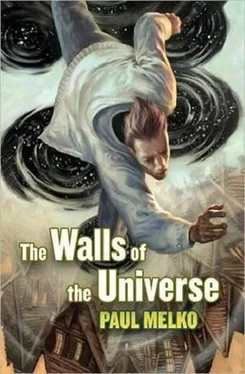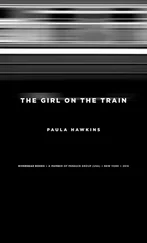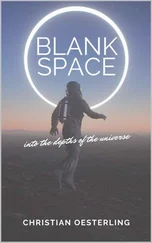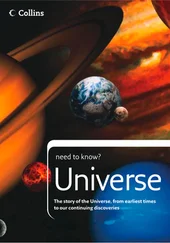John’s faint shadow must have alerted him.
“Dad?” John Subprime said, then turned. “My God!” He shrank away from the raised shovel, his eyes passing from it to John’s face. His expression changed from shock to fear.
John’s body strained, the shovel raised above his head.
John Subprime leaned against the sheep pen, one arm raised.
He had only one arm.
Nausea washed through John’s body, and he dropped the shovel. It clattered on the wood floor of the barn, settled at John Subprime’s feet.
“What am I doing?” John cried. His stomach heaved, but nothing came up but a yellow bile that he spat on the floor. He heaved again at the smell of it.
He was no better than Prime. He didn’t deserve a life.
John staggered to the back door of the barn.
“Wait!”
He ran across the field. Something tangled his feet and he fell. He pulled his foot free and ran into the woods.
“Wait! Don’t run!”
John turned to see John Subprime running after him, just one arm, the right, pumping. He slowed five meters in front of John, then stopped, his hand extended.
“You’re me,” he said. “Only you have both arms.”
John nodded, his breath too ragged, his stomach too tense, to speak. Tears were welling in his eyes as he looked at the young man he had contemplated clubbing.
“How can that be?”
John found his voice. “I’m a version of you.”
John Subprime nodded vigorously. “Only you never lost your arm!”
“No, I never lost it.” John nodded his head. “How did it happen?”
John Subprime grimaced. “Pitchfork. I was helping Dad in the barn loft. I lost my balance, fell. The pitchfork caught my biceps, sliced it…”
“I remember.” In John’s universe, he’d been twelve and he had fallen from the loft while he and his father loaded it with hay. He had thought he could carry the bale, but he hadn’t been strong enough and he’d fallen to the farmyard, knocking the wind out of himself, bumping the pitchfork over as he fell. The pitchfork had landed next to him, nicking his shoulder. His father had looked on in horror and then anger. The scolding from John’s mother had been worse than the nick. “I just got a cut on my shoulder. In my world.”
John Subprime looked confused. Then he laughed. “In one world I lose my arm, and in another I get a scratch. Don’t that beat all.” Why was he laughing?
“Yeah.”
“Why don’t you come inside and have some breakfast?”
John looked at him, unsure of how he could ask that. He yelled, “I was going to steal your life!”
John Subprime nodded. “Is that why you had the shovel? Then you saw my arm. No way you could steal my life. You’ve got two arms.” He laughed.
“It wasn’t just that,” John said. “I couldn’t bring myself to hurt…”
“Yeah, I know.”
“No, you don’t” John yelled. “I’ve lost everything!” He reached into his shirt and toggled the universe counter. “I have to leave.”
“No. Wait!” John Subprime yelled.
John backed away and pulled the lever.
The world blurred and John Subprime blinked away.
There was the barn and the farmhouse, and off in the distance John’s father on the tractor. Another universe where he didn’t belong. He toggled the device and pulled the lever. Again the farmhouse. He didn’t belong here either. Again he moved forward through the universes. The farmhouse was gone. And again. Then it was there, but green instead of red. He toggled the counter again and again, wanting to get as far away from his contemplated crime as possible.
The clouds flew around in chaotic fast motion. The trees he stood in were sometimes there, sometimes not. The farmhouse bounced left and right a foot, a half foot. The barn more, sometimes behind the house, sometimes to the east of it. The land was the one constant, a gently sloping field. Once he found himself facing the aluminum siding of a house. And then it was gone as he transferred out.
A hundred times he must have transferred through universe after universe where he didn’t belong until finally he stopped and collapsed to the ground, sobbing.
He’d lost his life. He’d lost it all, and he’d never get it back.
He rested his head against the trunk of a maple and closed his eyes. After the tears were gone, after his breathing had slowed, he slept, exhausted.
“Hey there, fella. Time to get up.”
Someone poked him. John looked up into his father’s face.
“Dad?”
“Not unless my wife’s been hiding something from me.” He offered a hand, and John pulled himself up. John was in the copse of maples, his father from this universe standing beside him, holding a walking stick. He didn’t recognize John.
“Sorry for sleeping here in your woods. Got tired.”
“Yeah. It’ll happen.” He pointed toward Gurney with his stick. “Better be heading along. The town’s that way.” He pointed north. “About two miles.”
“Yes, sir.” John began walking. Then he stopped. His father hadn’t recognized him. Which meant what? John wasn’t sure. He turned back to him. “Sir, I could use some lunch. If you have extra. I could work it off.”
Bill Rayburn-John forced himself to use the name in his head; this man was not his father-checked his watch, then nodded. “Lunch in a few minutes, my watch and my stomach tell me. Cold cuts. As to working it off, no need.”
“That’s fine.”
“What’s your name?”
“John… John Wilson.” He took Professor Wilson’s last name spontaneously.
John turned and followed Bill across the pumpkin field toward the house. The pumpkins were still on the vine, unpicked and just a week until Halloween. Some of them were already going bad. John passed a large one with its top caved in, a swarm of gnats boiling out of it.
He remembered the joke his father had told him a week ago.
“How do you fix a broken jack-o’-lantern?” he asked.
Bill turned and glanced at him as if he were a darn fool.
“I don’t know.”
“With a pumpkin patch,” John replied, his face straight.
Bill stopped, looked at him for a moment; then a small smile crept across his lips. “I’ll have to remember that one.”
The barn was behind the house, smaller than John remembered and in need of paint. There was a hole in the roof that should have been patched. In fact, the farm seemed just a bit more decrepit than he remembered. Had hard times fallen on his parents here?
“Janet, another one for lunch,” Bill called as he opened the back door. “Leave your shoes.”
John took his shoes off, left them where he always did. He hung his bag on a hook. It was a different hook, brass and molded, where he remembered a row of dowels that he and his father had glued into the sideboard.
John could tell Janet wasn’t keen on a stranger for lunch, but she didn’t say anything, and she wouldn’t until she and Bill were alone. John smiled at her, thanked her for letting him have lunch.
She wore the same apron he remembered. No, he realized. She’d worn this one, with a red check pattern and deep pockets in front, when he was younger.
She served John a turkey sandwich, with a slice of cheese on it. He thanked her again as she did, and ate the sandwich slowly. Janet had not recognized him either.
Bill said to Janet, “Got some good apples for cider, I think, a few bushels.”
John raised his eyebrows at that. He and his father could get a couple bushels per tree. Maybe the orchard was smaller here. Or maybe it had been hit with blight. John glanced at Bill and saw the shake in his hand. He’d never realized how old his father was, or maybe he had aged more quickly in this universe for reasons unknown. Maybe a few bushels was all he could gather.
Читать дальше












